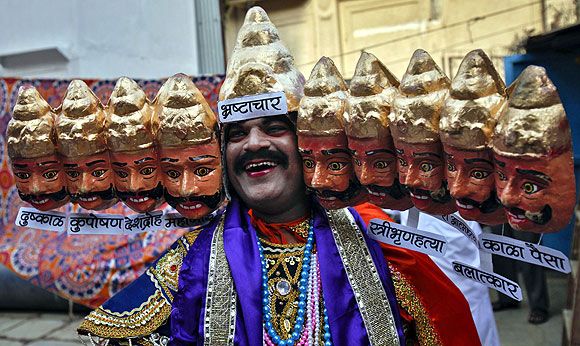It is the voter who has corrupted politics, not the politician, says Aakar Patel.

Some time ago I had a frank and open discussion with a man from a political clan, who was then a legislator and is today a minister. Our talk was on corruption in politics and the use of money by politicians.
He said to me that over half of the money spent by any party on campaigning was directly given to voters as a bribe. And of that money, 50 per cent was spent on the afternoon of the day of voting. It was given to those who had deliberately not voted till that time, so that they could squeeze the parties into paying them. This is why, during elections, there are often reports of large sums of cash being found with political leaders and their associates.
I was reminded of that conversation when news came of a survey commissioned by Bihar's chief electoral officer. It showed that 80 per cent of voters surveyed felt that accepting money or gifts to vote for someone was not a bribe and not morally wrong.
Alarmed by the findings, the Election Commission has begun putting up posters and creating radio spots to counter this attitude in Bihar, where elections are currently underway.
The data came from a sample of 4,500 voters, and reports on it indicated that it was scientific and statistically sound. The group had been selected in a particular way to maintain a balance, with voters from high and low turnout districts chosen in equal numbers.
And, of course, this is something that the Election Commission itself has put out. This means that the data is credible. I for one did not find it surprising, and I do not think this attitude is limited to Bihar.
The politician with whom I had that conversation I referred to above is from Karnataka.
A few years ago, there was a report of how Tamil Nadu's political parties were sending cash inserted into the newspapers on voting day. Particular newspapers were read by those who followed particular ideologies. And so it was easy for the parties to identify their potential voters.
Many stories have been published about the distribution of clothes, alcohol and other things by politicians, often openly, to voters. This is seen as something that only attracts the voters in the slums and does not affect the middle class, but there is no data or evidence to show this bribing is limited to the poor.
The study by the Election Commission in Bihar shows that we do not have enough analysis of our society and its faults. The debate in our drawing rooms and our media tends to focus on politicians and on government, rarely on ourselves. Corruption is seen as something in which the common man is only a victim, not a participant. Improvements in society are seen as the responsibility of government and political parties.
The Bihar episode is only the latest which shows that such thinking is very naive. There are other instances which show that Indians think their theft and immorality are perfectly fine.
Only around three per cent of Indians pay income tax. The vast majority of those who pay are urban, middle class, salaried people whose tax is deducted by their company. Even here there is high incidence of theft and avoidance, using various available exemptions even where they are not really applicable.
And the fact is that if these employees were voluntarily asked to pay instead of being forced to through automatic deduction, the rate would drop further.
I know, and most people in the middle class will know, people who run businesses that make millions but do not pay much tax because that is seen as a 'loss' instead of a legitimate due.
Another thing that is often said when this is pointed out is that the government does not use the money properly so the businessman does not feel obliged to pay.
It should not surprise us when the same lack of principles and lack of morality crop up among voters. If we analyse this correctly, we will be forced to conclude that it is in fact the voter who has corrupted politics, not the politician.
Political parties that try to run clean campaigns will probably fail in a place like India. Even the Aam Aadmi Party's ministers have begun taking bribes, as the party itself admits.
The reason they are doing so is not to stash away that money in Switzerland, but in turn to bribe the voters.
It is the sort of vicious circle that can only be produced in a place like India.
Image published only for representational purposes. Photograph: Vivek Prakash/Reuters
Aakar Patel is Executive Director, Amnesty International India. The views expressed here are personal.










